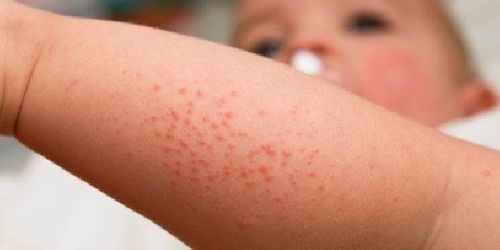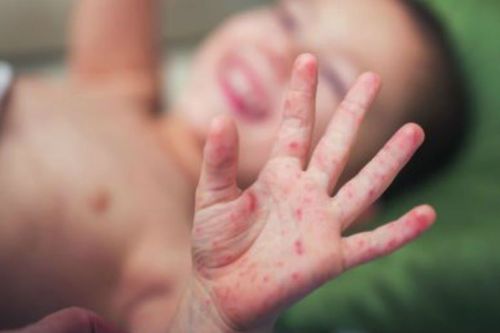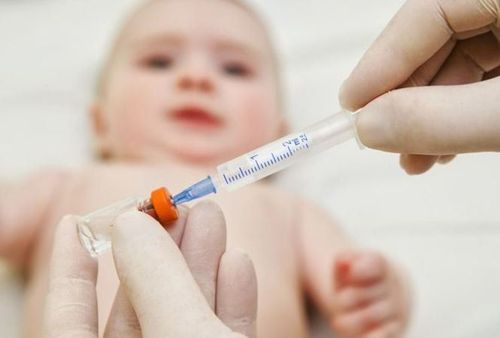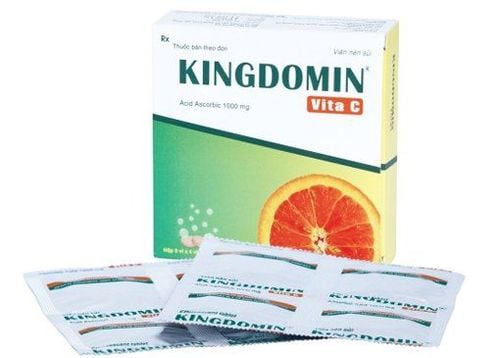This is an automatically translated article.
The article was professionally consulted by Dr. CKI Nguyen Thi My Linh - Department of Pediatrics - Neonatology - Vinmec International General Hospital Da Nang. Uncle has 12 years of experience in the diagnosis and treatment of pediatric diseases, especially neonatal resuscitation and neonatal treatment. In addition, the doctor has strengths in the field of breastfeeding counseling as well as examination, counseling and nutritional intervention in children.Typhus and measles, dengue are different diseases but have similar initial symptoms. Therefore, patients are easily confused leading to misdiagnosis. Detecting and distinguishing between typhus and measles and dengue fever will help patients in monitoring and care.
1. Overview of typhus, measles, dengue fever
Typhus is a common disease in children, especially children aged 6 - 36 months, causing high fever, itching, and discomfort. Itchy typhus in children and adults is caused by the human herpes virus 6 or, in some cases, by the human herpes virus 7. People get sick by contracting these viruses through physical contact with infected people or their personal items.Measles Measles is a disease caused by a strain of morbillivirus, family Paramyxoviridae - an acute virus that is dangerous and can cause serious complications if not treated properly and promptly.
Dengue Fever Dengue fever is an acute infectious disease caused by the Dengue virus. Dengue is transmitted by mosquitoes that transmit the dengue virus from an infected person to a healthy person. Dengue fever can cause severe pain in the muscles and joints.
The disease occurs all year round, often increasing in the rainy season. The disease occurs in both children and adults. If the disease is not diagnosed early and treated promptly, it can easily lead to severe dengue fever, which can cause heavy bleeding, sudden drop in blood pressure due to shock and death.
2. Distinguish typhus from measles, dengue fever
2.1. PathogenTyphus is mostly caused by common viral infections (70% - 80%), in which respiratory viruses always account for the majority and most are benign viruses. The causative agent of measles is a virus of the genus morbillivirus of the family Paramyxoviridae. Measles is an acute viral infection. Dengue fever is caused by the dengue virus, which is transmitted by the mosquito Aedes aegypti. The infection cycle is mainly female Aedes mosquitoes sucking the blood of patients infected with dengue virus, then this virus will incubate in the mosquito's body for 8 to 11 days and then continue during that time to transmit the disease to humans.
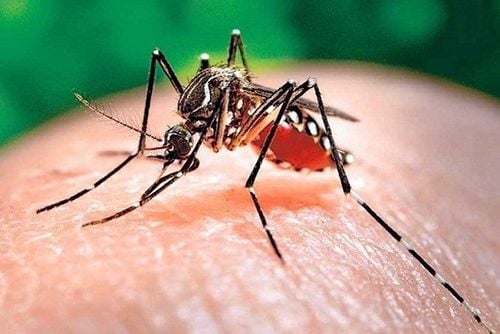
Incubation period The incubation period, the onset of typhus, measles, and dengue fever, averages about 1 week.
However, at the onset of typhus, measles often presents quite similar, expressed through the symptoms of viral typhus as the patient has a fever (mild fever or high fever 38 – 10). 39 degrees Celsius), feeling tired, lethargic because of high fever.
Dengue fever has flu-like symptoms. The patient begins to have a high fever, the temperature may rise suddenly, fever up to 39-40 degrees Celsius continuously for several days. Accompanied by a feeling of nausea or vomiting, sore throat, pain in the eye sockets, runny nose, diarrhea.... Just like typhus in children, dengue fever in children will complain of headaches. or muscle aches, children anorexia, anorexia, some children may have vomiting or diarrhea.
Full-blown phase The difference between typhus, measles and dengue is most pronounced in the full-blown phase.
Fever typhus: After the fever subsides, the patient will have a rash, this is a smooth and bright erythema, less raised on the skin, a rash that spreads all over the body of the child and usually leaves no sign after flying. What's on the baby's skin?
Measles rash: The rash first appears behind the ears, then spreads to the face, gradually down to the chest and abdomen and to the whole body. When the measles rash disappears, it also disappears in the same order it appeared on the skin. Measles rash is characterized by a papule form, raised on the skin, when it disappears, it will leave a very characteristic bruise on the skin often called "tiger skin".
Typhus also has a red rash similar to dengue fever. To differentiate, use the thumb and index finger of the same side to stretch the skin around the rash. If you see the red dot disappear, let go of the hand, the red dot will recover immediately, it is typhus. If you still see tiny dots, or after 2 seconds the red color appears again, it is dengue fever.
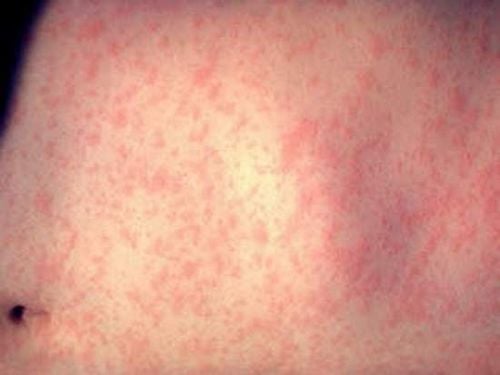
Typhus:
Because most common viruses are benign diseases. When a child has typhus, if properly cared for in terms of nutrition and body hygiene, the disease will clear up on its own after 5-7 days and rarely cause any dangerous complications.
Measles:
It can cause many dangerous complications for children if sick children are not detected and treated in time, especially children with poor resistance such as severely malnourished children, infants. children under 12 months of age), children who are taking anti-inflammatory corticosteroids continuously and for a long time.
Complications of measles often occur including:
Acute otitis media accounts for about 10%, Severe pneumonia complications account for about 5%, Some other dangerous complications are less common, such as encephalitis complications, accounting for approx. 1‰, corneal ulcers that can cause blindness and severe malnutrition following measles infection are also serious complications caused by measles. Dengue fever:
Hemorrhagic shock: Because hemorrhagic disease causes increased capillary permeability, plasma drainage and hemostasis, the manifestation of shock is that blood will be ejected. The loss of a lot of blood makes the body exhausted and has a high fever for a long time, sweating, vomiting a lot. Eye complications: Dengue fever can lead to sudden blindness due to retinal bleeding or bleeding in the vitreous fluid that covers and dissolves, making the patient almost blind. Heart and kidney failure: Dengue fever can lead to heart failure due to continuous bleeding. This can lead to acute kidney failure. Pleural effusion: Blood plasma spilled in the body can cause respiratory inflammation, pleural effusion or pneumonia, acute pulmonary edema. If not treated, it can be life-threatening. Women with dengue fever during pregnancy will affect the fetus. It can even lead to miscarriage.
3. Prevention of typhus, measles, dengue fever

As a key area of Vinmec Health system, Pediatrics Department always brings satisfaction to customers and is highly appreciated by industry experts with:
Gathering a team of top doctors and nurses in Pediatrics : consists of leading experts with high professional qualifications (professors, associate professors, doctorates, masters), experienced, worked at major hospitals such as Bach Mai, 108.. Doctors All doctors are well-trained, professional, conscientious, knowledgeable about young psychology. In addition to domestic pediatric specialists, the Department of Pediatrics also has the participation of foreign experts (Japan, Singapore, Australia, USA) who are always pioneers in applying the latest and most effective treatment regimens. . Comprehensive services: In the field of Pediatrics, Vinmec provides a series of continuous medical examination and treatment services from Newborn to Pediatric and Vaccine,... according to international standards to help parents take care of their baby's health from birth to childhood. from birth to adulthood Specialized techniques: Vinmec has successfully deployed many specialized techniques to make the treatment of difficult diseases in Pediatrics more effective: neurosurgery - skull surgery, stem cell transplantation. blood in cancer treatment. Professional care: In addition to understanding children's psychology, Vinmec also pays special attention to the children's play space, helping them to have fun and get used to the hospital's environment, cooperate in treatment, improve the efficiency of medical treatment.
Please dial HOTLINE for more information or register for an appointment HERE. Download MyVinmec app to make appointments faster and to manage your bookings easily.






